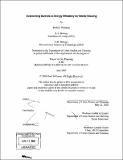| dc.contributor.advisor | Judith A. Layzer. | en_US |
| dc.contributor.author | Williams, Beth E. (Beth Ellen) | en_US |
| dc.contributor.other | Massachusetts Institute of Technology. Dept. of Urban Studies and Planning. | en_US |
| dc.date.accessioned | 2009-01-30T16:35:39Z | |
| dc.date.available | 2009-01-30T16:35:39Z | |
| dc.date.copyright | 2008 | en_US |
| dc.date.issued | 2008 | en_US |
| dc.identifier.uri | http://hdl.handle.net/1721.1/44348 | |
| dc.description | Thesis (M.C.P.)--Massachusetts Institute of Technology, Dept. of Urban Studies and Planning, 2008. | en_US |
| dc.description | Includes bibliographical references (p. 88-92). | en_US |
| dc.description.abstract | Improving building energy efficiency is widely recognized as one of the best strategies for combating climate change and other energy problems. Energy efficiency implementation has been slow, however, due to a number of practical barriers, and few building sectors face higher hurdles to energy efficiency than rental housing. In this thesis I ask: What are the major barriers to investment in energy efficiency for rental housing? How well do existing policies and programs address these barriers? And finally, which strategies are best suited to overcome the barriers that face rental housing efficiency? I describe several barriers, from split incentives to transaction costs, that limit energy efficiency for rental housing. Existing policies and efficiency programs do not adequately address most of these barriers. While there is no silver bullet solution to facilitate energy efficiency for rental housing, I identify a variety of policy options that can be implemented at the federal, state, and local levels. One measure in particular, a "green lease," holds great promise for overcoming split incentives and other obstacles. A combination of voluntary and regulatory measures will be necessary to deeply penetrate the rental housing efficiency market. Finally, I argue that policy packages must be tailored to the conditions of local rental housing markets, and local energy initiatives hold great promise as part of the solution. | en_US |
| dc.description.statementofresponsibility | by Beth E. Williams. | en_US |
| dc.format.extent | 92 p. | en_US |
| dc.language.iso | eng | en_US |
| dc.publisher | Massachusetts Institute of Technology | en_US |
| dc.rights | M.I.T. theses are protected by
copyright. They may be viewed from this source for any purpose, but
reproduction or distribution in any format is prohibited without written
permission. See provided URL for inquiries about permission. | en_US |
| dc.rights.uri | http://dspace.mit.edu/handle/1721.1/7582 | en_US |
| dc.subject | Urban Studies and Planning. | en_US |
| dc.title | Overcoming barriers to energy efficiency for rental housing | en_US |
| dc.type | Thesis | en_US |
| dc.description.degree | M.C.P. | en_US |
| dc.contributor.department | Massachusetts Institute of Technology. Department of Urban Studies and Planning | |
| dc.identifier.oclc | 276307447 | en_US |
